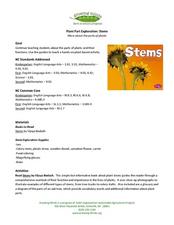Baylor College
Plant Parts You Eat
Plants provide a variety of delicious foods essential for human survival. In the fourth lesson of this series on food science, young scientists investigate common fruits, vegetables, and grains in order to determine which plant part is...
Curated OER
Plant Parts and their Function
Discover why plants are important to our world. View plant parts and categorize them as stems or buds. Students do a cut and paste of pictures of plants into correct categories. Students also plant a carrot top,and record...
Curated OER
Plant Part Exploration: Stems
Explore water transport in plant stems using this fun experiment! Your scientists will start by reading Stems by Vijaya Bodach. Then, activate prior knowledge about plant stem functions and water transportation....
Curated OER
Discovering Local Food Chains
Fourth graders study about food chains. With the assistance of a local biologist, Students hike the school trail system. They explore ecosystem and collect data by charting the organisms found and identifying the energy source. They...
Baylor College
Do Plants Need Light?
Turn your classroom into a greenhouse with a lesson on plant growth. First, investigate the different parts of seeds, identifying the seed coat, cotyledon, and embryo. Then plant the seeds and watch them grow! Measure the new plants...
Curated OER
Food Chain
Fourth graders explore the concept of food chains. For this food chain lesson, 4th graders discuss what different animals eat and how they are all connected. Students explore a garden and the environment around them to find examples of a...
Curated OER
Edible and Medicinal Plants: Field Trip Guide
Though it's designed to guide a field trip to the New York Botanical Garden, you could take resource like this one to a local park, wilderness area, school garden, or even a weedy empty lot. Middle schoolers identify plant parts and...
Curated OER
Where are Koalas on the Food Chain?
Take a field trip to observe Koalas, absolutely! Budding scientists become familiar with the Koala's position in the food chain. They answer questions based on what they see and draw a food chain explaining the Koalas position. Tip: A...
Garden Earth Naturalist Club
Parts of a Flower! Flower Dissection
Sometimes the best way to learn about plants is to see the different parts of a plant yourself. Groups of learners dissect flowers to answer questions about what they observe and what they wonder about their flower.
Curated OER
Plants
One slide reviews the main plant parts and most of the remaining slides address seven plant processes of life. This is a different approach to introducing the life of a plant. Three tasks are assigned to viewers on the last slide, making...
Exploring Nature Educational Resources
Building A Classroom Food Web
From bears and owls to chipmunks and trees, all life depends on the sun for the energy to survive. Young biologists develop an understanding of this big idea as they arrange this series of plant and animal picture cards into food...
Serendip
A Scientific Investigation – What Types of Food Contain Starch and Protein?
You are what you eat, as they say! Are you more starch or more protein? Young scholars use their knowledge of each component to test different foods for their content. Using multiple indicators, individuals describe the protein and...
Captain Planet Foundation
Energy Flow in the Garden
How can you tell what an owl has eaten? Study the food chain and flow of energy in an ecosystem by dissecting an owl pellet and noting the bones found inside. Additionally, the lesson includes a game about consumers and producers with a...
Curated OER
Benefits of Indoor Plants
Young scholars diagram a plant. In this Science lesson plan, students explore the concept of photosynthesis focusing on the oxygen production. Young scholars calculate the amount of plants needed to filter the air in their classroom.
Curated OER
What Parts of a Plant Do We Eat?
Did you know that tomtoes and cucumbers are actually fruits? Biology or botany beginners read about the function of flowers and fruit and find that some food items commonly called vegetables are, by definition, also fruits! Give learners...
Curated OER
Create a Food Chain
Students discover the connection between plants and animals by discussing simple food chains. Students explore what may happen when parts of a food chain are removed. Students wrap up the lesson by writing a story about a food chain.
Curated OER
Food chains and webs
Here is an extremely simplistic look at food chains and webs. It depicts three different food chains, each containing a plant, plant eater, and meat-eater. Learners fill in the missing part of each chain by using the images provided at...
Curated OER
Links in a Food Chain
Little ones make costumes and act out a rhyme in which there are daisies, bugs, wrens, snakes, and foxes that all interact in a food web. This would be a memorable activity for primary life scientists to participate in as a wrap-up...
Curated OER
Plant Parts
Little ones identify the parts of a plant and practice following directions at the same time. They color each part of the flowering plant the color indicated on the sheet. Roots are brown, leaves are green, the flower is red, and the...
Curated OER
How Are Plants Similar And Different?
Studetns create an index card database of different categories of plants such as bushes, trees, flowers, grasses and vegetables. They review the different parts of a plant and label pictures of plants on the database cards. They use the...
Curated OER
Nutrients for Plants and People: Reading Food Labels for Nutrition
Apply work with the food pyramid with this worksheet. Have your class go through their cupboards at home and find 5 different foods to inspect. On this handout, they record the food, what part of the food pyramid this food fits into, and...
Curated OER
Six Plant Parts
Students create a harvest burrito out of fruit, flowers, roots, stems, and more. In this plants lesson plan, students go out into the garden and identify the 6 plant parts.
Curated OER
Energy Flow and the Food Chain
Students complete discussions and worksheets about the Hawaiian food chain. In this food chain lesson plan, students research decomposers, consumers, and producers.
Curated OER
Where do Plants Get their Food?
In this where do plants get their food worksheet, students design an experiment that will disprove the idea that plants obtain their food from soil. Students will set up their experiment and design a data table that will record data over...

























